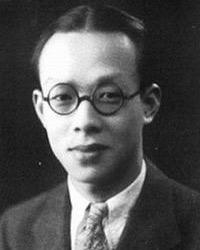Zhou Youguang | |||||||||||
|---|---|---|---|---|---|---|---|---|---|---|---|
周有光 | |||||||||||
 Zhou in the 1920s | |||||||||||
| Born | 13 January 1906 Changzhou, Jiangsu, Qing dynasty | ||||||||||
| Died | 14 January 2017 (aged 111) Beijing, China | ||||||||||
| Known for | Development of pinyin; supercentenarian | ||||||||||
| Political party | China Democratic National Construction Association | ||||||||||
| Spouse | |||||||||||
| Children | 2 | ||||||||||
| Academic background | |||||||||||
| Alma mater | |||||||||||
| Academic work | |||||||||||
| Notable works | The Historical Evolution of Chinese Languages and Scripts | ||||||||||
| Chinese name | |||||||||||
| Chinese | 周有光 | ||||||||||
| |||||||||||
| Birth name | |||||||||||
| Chinese | 周耀平 | ||||||||||
| |||||||||||
Zhou Youguang (Chinese: 周有光; pinyin: Zhōu Yǒuguāng; 13 January 1906 – 14 January 2017), also known as Chou Yu-kuang or Chou Yao-ping, was a Chinese economist, linguist, sinologist, and supercentenarian. He has been credited as the father of pinyin,[1][2][3] the most popular romanization system for Chinese, which was adopted by the People's Republic of China (PRC) in 1958, the International Organization for Standardization (ISO) in 1982, and the United Nations in 1986.[3][4]
- ^ Cite error: The named reference
china.orgwas invoked but never defined (see the help page). - ^ Branigan, Tania (21 February 2008). "Sound Principles". The Guardian. Archived from the original on 21 November 2016. Retrieved 12 July 2009.
- ^ a b Margalit Fox (14 January 2017). "Zhou Youguang, Who Made Writing Chinese as Simple as ABC, Dies at 111". The New York Times. Archived from the original on 20 January 2017.
- ^ Bristow, Michael (22 March 2012). "The man who helped 'simplify' Chinese". BBC News. Archived from the original on 22 January 2015. Retrieved 20 January 2017.